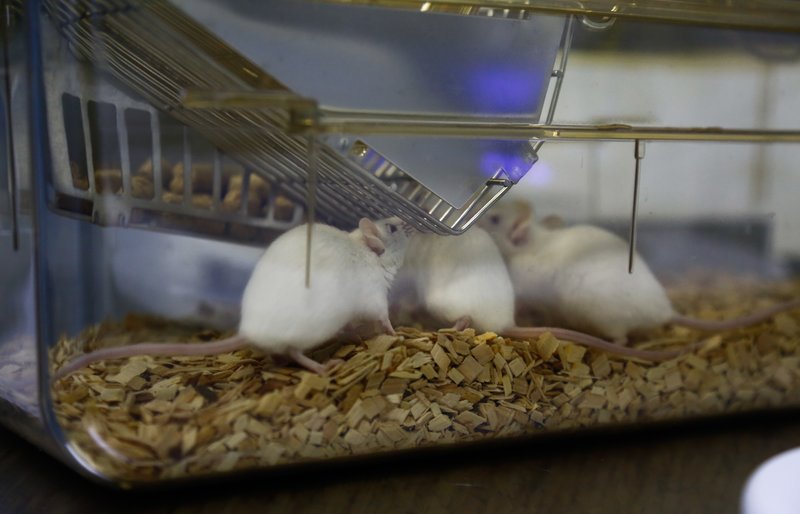首例雙父小鼠慘死,,繁殖方法或可用于拯救瀕危物種

|
利用近幾年出現(xiàn)的基因編輯技術(shù),,中國(guó)研究者使用兩只雄性小鼠的細(xì)胞和兩只雌性小鼠的細(xì)胞分別培育出了能夠成活的小鼠胚胎,。根據(jù)研究者向《細(xì)胞·干細(xì)胞》雜志(Cell Stem Cell)提交的報(bào)告,,移植后的胚胎均發(fā)育足月,但孤雄小鼠在出生幾天后就死亡,。 這是首次培育出雙父無(wú)母哺乳動(dòng)物,此前日本研究者曾于2004年培育出雙母無(wú)父小鼠,。那次實(shí)驗(yàn)中,,研究者將尚未成熟的卵子注入類似精子的細(xì)胞中,,移除一對(duì)影響胚胎生長(zhǎng)的基因,。大部分新生小鼠都未能存活至成年,原因很可能是對(duì)小鼠基因進(jìn)行的干擾,,但其中一只雌鼠成年并孕育了后代,。 像火雞,許多爬行類動(dòng)物,、兩棲類動(dòng)物和魚(yú)類在無(wú)法找到異性時(shí)可以自我繁衍,。一些物種在當(dāng)?shù)胤N群雄性或雌性比例過(guò)高的情況下,甚至可以改變自己的性別以實(shí)現(xiàn)繁殖,。 在前文所述的中國(guó)項(xiàng)目中,研究者使用了一種被稱為CRISPR/Cas9的更加精準(zhǔn)的基因編輯工具,,因而可以刪除三個(gè)會(huì)影響單性別胚胎發(fā)育的基因信息段。通過(guò)這種方式,,孤雌小鼠得以生長(zhǎng)并進(jìn)行正常繁衍,,但確實(shí)存在一些異常。 從兩只雄性小鼠孕育胚胎需要在六個(gè)位置刪除遺傳物質(zhì),。然而,,這些外界介入導(dǎo)致小鼠幼崽體型異常,因體液過(guò)多造成腫脹,,最終死亡時(shí)內(nèi)臟破裂,、舌頭腫大、無(wú)法合上眼皮,。它們僅僅存活了48小時(shí)。 研究者告訴《科學(xué)新聞》(Science News),,他們無(wú)意在人體上進(jìn)行類似實(shí)驗(yàn),。由于每一物種的基因密碼都存在差異,這種方式在人體上可能無(wú)法成功,。但如果研究者可以將上述方法運(yùn)用于其它物種,,或許可以用于拯救北白犀等瀕危物種,,目前地球上僅有兩頭雌性北白犀幸存。 通過(guò)在實(shí)驗(yàn)室研究抑制不同基因通道對(duì)胚胎會(huì)產(chǎn)生何種影響,,也可以讓研究者了解基因是如何引導(dǎo)正常發(fā)育的,。但談到將此用于人類研究,“這是個(gè)很大的倫理問(wèn)題,?!毕耐拇髮W(xué)的莫妮卡·沃德告訴《國(guó)家地理》(National Geographic)說(shuō)。(財(cái)富中文網(wǎng)) 譯者:龐洋 |
Using a gene-editing method that has emerged in the last few years, Chinese researchers have created viable mouse embryos using cells from two males and, separately, from two females. The implanted embryos grew to term but the male-only pups died a few days after birth, the researchers report in Cell Stem Cell. It is the first case of mammals with two fathers and no mothers, though Japanese researchers created fatherless mice with two mothers in 2004. That time, researchers converted an immature female egg into a sperm-like cell and removed a pair of genes involved in fetal growth. Most of the pups did not survive to adulthood, probably due to the interference with their genes, but one did and had pups of her own. Other animals—including turkeys and many reptiles, amphibians and fish—can self-fertilize when unable to find members of the opposite sex. Some can even change their sex in order to reproduce in the local male-heavy or female-heavy community. In the recent Chinese project, researchers used a more precise gene-editing tool called CRISPR/Cas9, which allowed them to trim three stretches of genetic information known to otherwise interfere with single-sex embryo development. The pups grown this way from two female parents grew up and had normal fertility, though they did suffer from some abnormalities. Forming embryos from two male parents required trimming more genetic material in six places. However, the interference caused those pups to grow in grotesque proportions, inflated by internal fluid until their guts leaked, their tongues swelled and they could not close their eyelids. They lived only 48 hours. The researchers have no plans to do similar experiments in humans, they told Science News. Because of differences between the genetic code in each species, it may not even work in humans. But if researchers could adapt it to other species, they might be able to help save endangered ones such as the northern white rhinoceros, of which only two females remain. Studying the effects of suppressing different genetic passages on embryos in the laboratory might also teach researchers more about how genes guide normal development. But as soon as they turn to humans, “It is really a big ethical question mark,” Monika Ward of the University of Hawai’i told National Geographic. |
-
熱讀文章
-
熱門(mén)視頻











